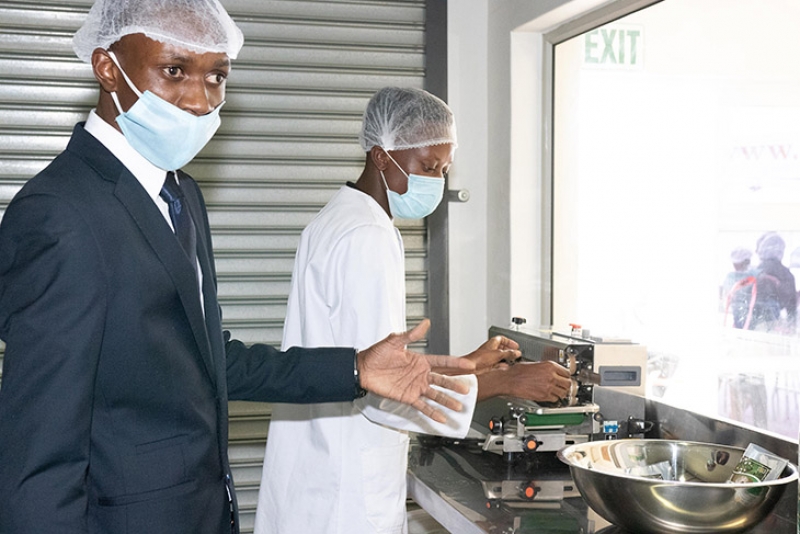 Call 061 290 8000
Call 061 290 8000 Click to mail us
Click to mail us FAQs
FAQs

DBN
The global need for sustainability is widely communicated, says Development Bank of Namibia Head of Risk and Compliance, Saima Nimengobe. The ongoing unfolding of climate change, as well as advocacy for fair social impacts highlight the imperatives that face entrepreneurs, governments and economic planners.
She says however that many pay lip service to the practice of sustainability. This is driven by the vast scope of the need and the collective nature of the responsibility, which enables players to shift responsibility to others who are perceived to be willing to take meaningful action. It is also motivated by the assumption that cutting corners will reduce costs.
The counter to this is to understand the hidden costs and risks that arise from environmental and social management (ESM) avoidance, and factor these into due diligence and governance of financing covenants. Financing which avoids elements of ESM is a risk to the provider of finance as well as the enterprise, says Nimengobe. By refocusing on risk and potential cost, the requirement for ESM adherence can be properly evaluated and understood in operational and accounting terms.
The first point Nimengobe makes is that ESM avoidance has licensing implications. The field of ESM in Namibia is primarily governed by the Environmental Management Act No 7 of 2007 and its regulations and the Labour Act No 11 of 2007 and its regulations. These are augmented by regulations of local authorities.
At the outset, all three make licensing conditional on preliminary adherence, however all provide for withdrawal of licenses and clearance certificates in the event of infractions of ESM conditions. This is the trigger for a sequence of events which could have severe financial implications, Nimengobe points out.
The most obvious implication is a halt to operations. In the case of an enterprise the impact will be felt in loss of revenues. In the case of infrastructure or an economic project, the outcome and revenue streams will be delayed. In both instances returns to the provider of finance will either be delayed or placed in jeopardy.
The immediate impact is also a set of costs that adds to expenditure. Although a fine may be seen as a limited cost for a mature and profitable operation, it may be significant and restrict a new or tenuous operation. In addition to this direct cost, there may be additional legal costs associated with the administration of a legal action and further fines if culpability warrants it. Rehabilitation of environmental and / or social damage becomes a vital further cost. The cost of insurance may also increase. If the fault was in the equipment or processes, corrective measures and potential capital investments will also add to the expense.
In the event of the enterprise or project resuming, it may also face licensing reluctance and rounds of inspections which may further delay resumption of operations.
At a more fundamental level, the enterprise is likely to lose market share. This can take place along the entire value chain. Suppliers may seek other opportunities and partners. Retailers, resellers, customers and consumers may respond negatively. Finally, competitors may step into market gaps further challenging the enterprise.
Nimengobe also notes that enterprises and projects that have been culpable of ESM failures will face reluctance from providers of finance.
Nimengobe advises providers of finance to develop ESM as a formal risk mitigation measure for their own sustainability as well as that of their borrowers, on whom repayment depends. Nimengobe also counsels inspections of enterprises, which might be carried out by a dedicated function in the organisation or by outsourced consultants. This, she says will also be a safeguard against inadvertent gaps in ESM adherence.
By developing strong relationships based on understanding of ESM, Nimengobe concludes, outcomes and projections can be secured for both financiers and borrowers.
Seasoned veteran of business finance, Robert Eiman, has taken over the reigns of the Development Bank of Namibia (DBN) SME Finance department. The move to place the Department under a Head follows the Bank’s resumption of SME activities in 2018. The department was previously managed by Acting Head, Hellen Amupolo, who is now Acting Head of Investments.
Talking about his mandate, Eiman said his priority will be to sustainably grow the Bank’s SME portfolio. He will also manage the skills-based facility for young professionals and artisans which is housed in the SME function, as well as the apex micro-lending facility. The apex micro-lending facility makes capital available for micro-lenders with a beneficial development impact to lend onwards to the public.
Eiman said that the operational emphasis will be to strengthen due diligence on applications. He noted that the recession and the Covid-19 pandemic has shown that it is vital that applicants show the best possible prospects of success. This he added will secure the financial wellbeing of owners, as well as their employees. He also pledged to find ways to speed up application assessments, however he cautioned applicants to ensure that their documentation is complete as incomplete applications would lead to delays.
Asked if there was a recipe for success, Eiman answered that there was no single winning formula for SMEs as each is unique. For this reason, each business must do their own application and not rely on consultants or readymade business plans that do not acknowledge the differences between businesses.
He said there are several characteristics of successful SMEs, the first of which is a rigorous approach to accounting and financial management. SMEs, Eiman explained, are fueled by accounts and debt obligations. Rigorous financial administration he said, enables SMEs to meet their obligations and not fall behind in payments. Unpaid bills place financial pressure on SMEs, and this leads to failure.
The second characteristic of success, Eiman enumerated, is for owners to budget their salaries, rather than making drawings against the business account. When the owner draws from the business account she or he is making a withdrawal from a vital reserve against periods of diminished cash flows. That reserve, he said, can also be deployed if the owner has the opportunity to grow or diversify the business.
The third characteristic Eiman drew attention to is partnerships rather than sole proprietorships. He illustrated the value of a partnership with the example of a highly skilled tradesman. The tradesman, Eiman explained, would be excellent at his craft but might not have the necessary business skills or the time to learn them. By partnering with a skilled business administrator, the tradesman could secure the future of his business with strong administration, as well as make more time to use his craft. In this way, partnering not only strengthens the business, but also grows it.
Asked about businesses that experience difficulties, Eiman said the aim of strengthened due diligence is to ensure that businesses financed by DBN have strong prospects of success. However, he acknowledged, the Bank will, at its own discretion, do what it can to assist businesses facing challenges. He motivated this with the Bank’s approach of securing businesses for the long term, rather than immediately taking possession of collateral.
Two of the remedies at the Bank’s disposal, are debt restructuring, and mentoring and coaching to build knowledge and capacity.
Robert Eiman was formerly Acting Head of Investments at DBN. His experience in the field of SMEs is augmented by experience as Head of SMEs at FNB Namibia. He holds an MBA (UNAM) and various certificates from the Institute of Bankers.
Development Bank of Namibia (DBN) has celebrated the culmination of its support to 2018 Innovation Award winner VNA Foods at the launch of the fledgling food company’s production facility in Windhoek. VNA won the Innovation Award for a proposal to manufacture packet soup, ‘Omboga’, from spinach.
DBN provided an extensive range of support activities that included recipe development, testing and refinement as well as barcode acquisition to enable the company to gain shelf space in local retailers. VNA also received grant funding which enabled it to begin operation.
Speaking at the launch of the production facility, DBN Head of Business Strategy, Heike Scholtz, said the Bank views innovation as a set of transformative activities which can take place in various sectors. She pointed to utilization of local resources and developing efficiency and economies of scale as particularly important.
The impact of innovation, Scholtz said, is that Namibia will become less dependent on imports and potentially create a basis for export trade. She added that developing efficiency makes Namibia more competitive as a national economy.
Talking about VNA, Scholtz said the product improves self-sufficiency as well as food security in Namibia. She noted that the ability of VNA to source its raw material locally strengthens agricultural livelihoods, and adds to the growing ecosystem of agri-enterprises. She also pointed out that VNA will add to the stock of enterprises in the manufacturing, and reiterated that growth of manufacturing is one of Namibia’s goals for the future economy.
She said it was significant that VNA was launched and is led by young entrepreneurs. DBN has assigned a high degree of importance on supporting and financing young entrepreneurs as a resource for the future of Namibia’s economy.
On the topic of the risk of innovation, she said innovative enterprises need support to manage and absorb their risks if they are to become sustainable, She called on to adopt finance for innovation, based on the principle that a project which is made bankable through derisking becomes a potential financing resource for the future.
She urged local distributors and retailers to add the product their selection and promote saying that the wholesale and retail sector can only become fully sustainable if it incorporates Namibian products in its offerings.
Talking about prospects for the company, Valde Leonard of VNA said the company has identified the commercial value of Namibian cuisine. He said VNA will embark on a contract harvesting/supply program with local Namibians and will focus on growing its product line in the short-term.
Leonard concluded by advising innovators to see the positive and make a lasting change empowers both innovators and the world around themselves.





